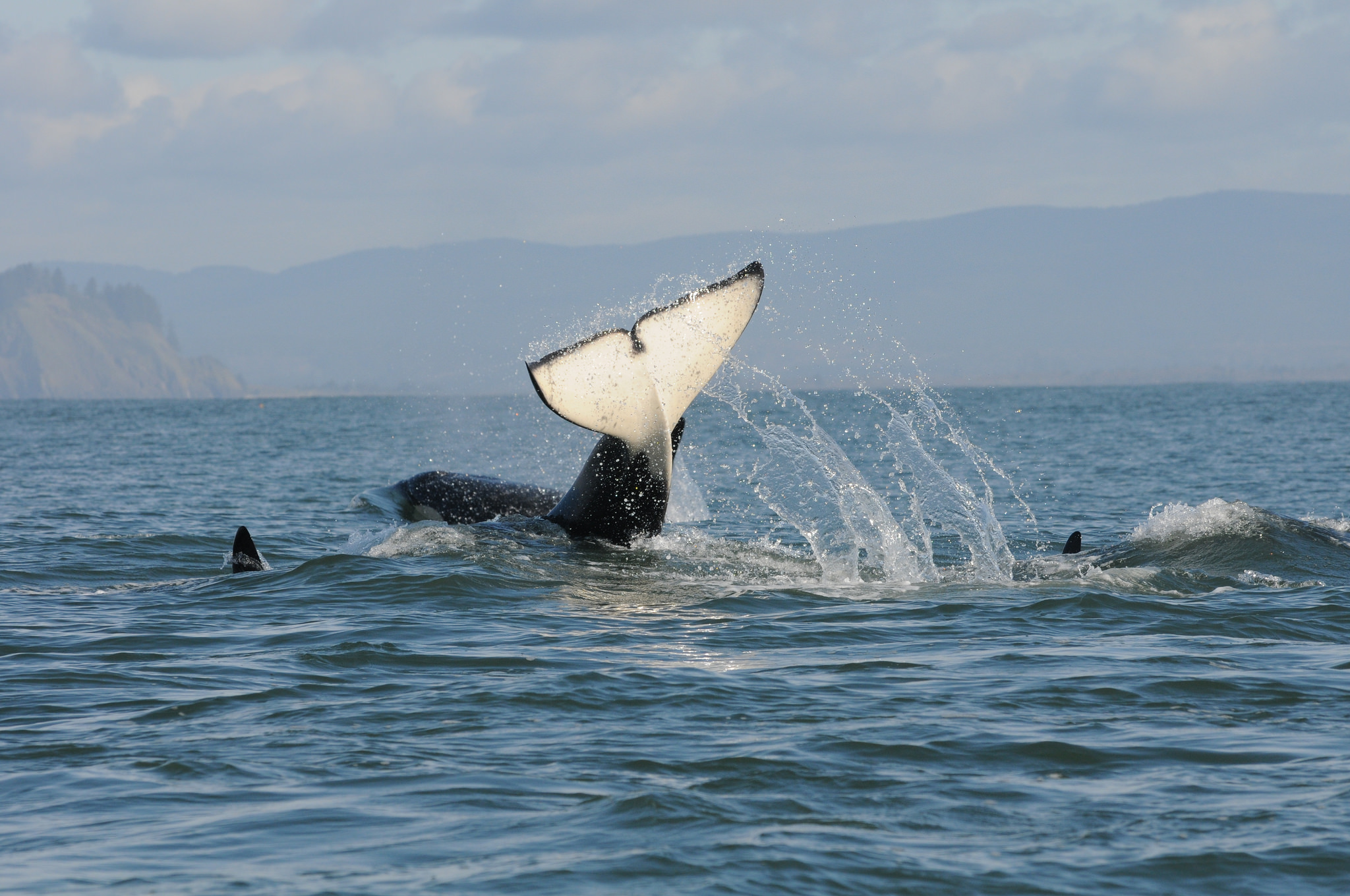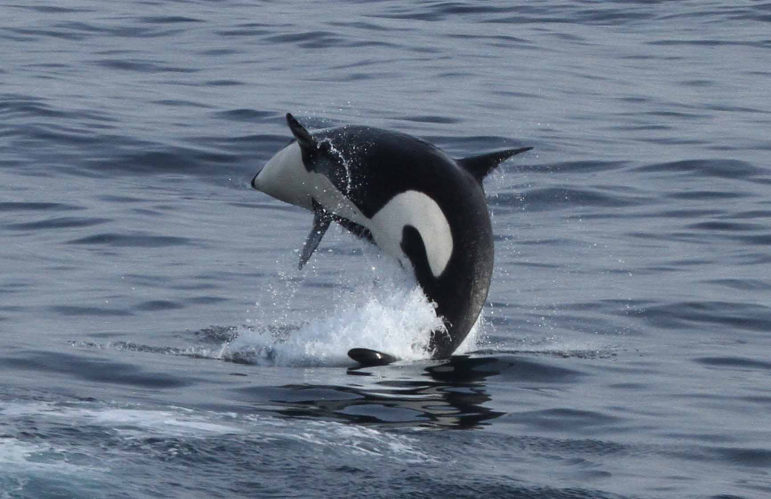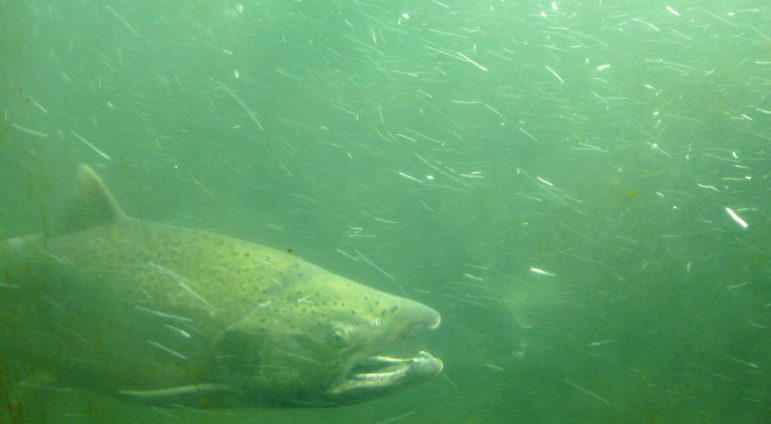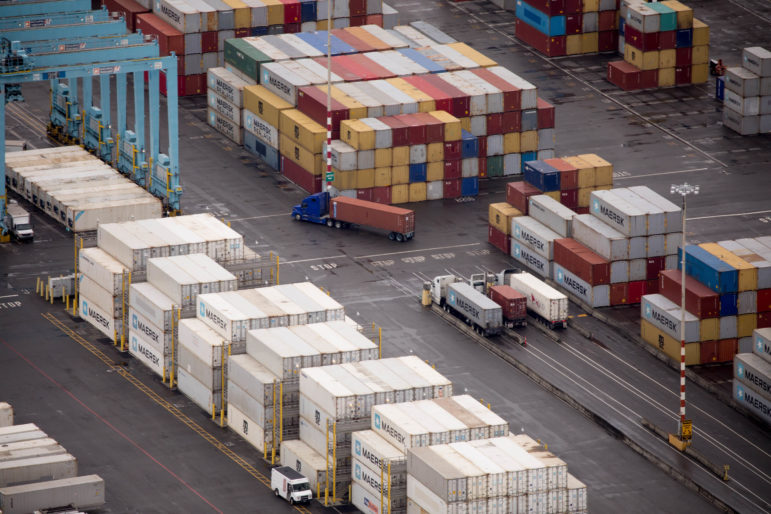You won’t pay an extra dime in the name of fighting climate change for every gallon of gasoline you buy. Puget Sound stands to be a tad better protected from oil spills when oil-tanker traffic jumps seven-fold, increasing the risk of a spill. And while your current microwave popcorn bag or burger wrapper likely contains a cancer-causing chemical, your future purchases — starting in 2022, or perhaps later — aren’t supposed to.
Those number among the mixed environmental results from this year’s whirlwind 60-day session of the Washington Legislature, marked by a few environmental firsts but also some significant losses for the greens on climate change that go beyond their inability to pass a carbon tax.
With Democrats controlling both legislative chambers and the governor’s mansion for the first time since 2012, environmentalists did succeed in banning fish farms raising Atlantic Ocean salmon, increasing funding to help protect endangered orcas, and closing a tax loophole to capture a whole lot more revenue from oil moved through pipelines to help protect against spills.
But while environmentalists had their best shot in years at advancing their agenda in a state that’s supposedly one of the nation’s greenest, it wouldn’t pass the straight-face test to claim major success.
“We made some progress. Not as much as we would like,” said Clifford Traisman, lobbyist for the Washington Environmental Council and other environmental groups who banded together as the Environmental Priorities Coalition. Two of their four main priorities passed, albeit in compromised form: toxic-free food packaging and efforts to better protect Washington waters from oil spills. “It gives us,” Traisman said, “a thirst to come back seeking more next year.”
As the dust settles, here’s a look at how the environment fared this year in Olympia:
What’s on your microwave popcorn bag? The answer could well be chemicals linked to cancer. Legislators voted to make Washington the first state in the nation to ban paper food packaging treated with a class of nonstick chemicals (nicknamed “PFAS”) — a ban that affects such products as microwave popcorn bags, French fry boxes, butter wrappers and fast-food sandwich wrappers.
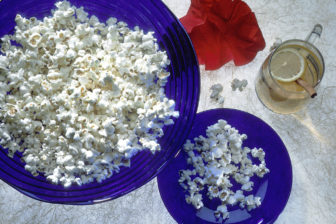 But there’s a pretty big catch: You’ll only get protection after the state Ecology Department identifies safer alternatives. The earliest the ban could go into effect is Jan. 1, 2022, according to the bill (HB 2658) sponsored by Democratic Rep. Joan McBride of Kirkland. Proponent Ivy Sager-Rosenthal of Toxic-Free Future is optimistic, suggesting companies could switch to the non-toxic packaging well before 2022: “We know that there are alternatives out there.” For example, most pizza boxes tested by her organization are safe. Popzup-brand microwave popcorn already uses safer packaging, she notes. PCC’s house-brand popcorn states on the box that its contains no PFOAs. And there’s always Jiffy Pop stove-top popcorn. Concerned? Environmental Working Group advises what you already know about healthy eating — eat home cooking and cut back on greasy carry-out foods, as they often come in coated wrappers.
But there’s a pretty big catch: You’ll only get protection after the state Ecology Department identifies safer alternatives. The earliest the ban could go into effect is Jan. 1, 2022, according to the bill (HB 2658) sponsored by Democratic Rep. Joan McBride of Kirkland. Proponent Ivy Sager-Rosenthal of Toxic-Free Future is optimistic, suggesting companies could switch to the non-toxic packaging well before 2022: “We know that there are alternatives out there.” For example, most pizza boxes tested by her organization are safe. Popzup-brand microwave popcorn already uses safer packaging, she notes. PCC’s house-brand popcorn states on the box that its contains no PFOAs. And there’s always Jiffy Pop stove-top popcorn. Concerned? Environmental Working Group advises what you already know about healthy eating — eat home cooking and cut back on greasy carry-out foods, as they often come in coated wrappers.
Another first-in-the-nation move. Lawmakers voted to make Washington the first state to ban firefighting foams that contain toxic perfluorinated chemicals, which have contaminated drinking water sources in Washington and raise the risk of cancer for people drinking that water as well as firefighters who come into contact with the chemicals in the foam. A caveat to the bill, sponsored by Democratic Sen. Kevin Van De Wege of Sequim (SB 6413), is it allows continued use of the toxic foams where required by federal law — such as at military bases, where the foam infamously has been blamed for poisoning people’s wells in Whidbey Island and elsewhere. The ban also doesn’t apply to some of the state’s most prominent industrial facilities, including oil refineries, chemical plants or other places where no effective alternatives are considered available. Environmental advocates say the ban will prod manufacturers to come up with safer alternatives. Several countries already reportedly use alternatives to put out jet fuel fires.
Can Puget Sound be protected from oil spills? A seven-fold increase is expected in the number of oil-laden tankers plying the Salish Sea shipping lanes — jumping from five tankers a month to 34 when a Canadian pipeline is expanded to bring oil to the coast from Alberta. The fuel being shipped west through the waters shared by Canada and Washington state is known as diluted bitumen, or dilbit. Sometimes it behaves differently from more-traditional petroleum products, sinking to the bottom instead of floating atop the water where some of it can be skimmed up. Legislators passed the Oil Spill Prevention Act (SB 6269) sponsored by Democratic Sen. Kevin Ranker of Orcas Island to strengthen protections for Puget Sound, hire state inspectors to check up on oil companies and, among other things, close a tax loophole for the 40 percent of oil that arrives to the state via pipeline. That money will significantly boost funding for the state Ecology Department to prepare better for oil spills.
“It’s not the slam dunk,” but the act “does pave the road to an ultimately bigger solution,” said an upbeat Fred Felleman, Seattle port commissioner, Friends of the Earth consultant and a longtime watchdog on oil spills. Felleman likes that the act calls for a forum to examine how to better prevent oil spills, to be composed of Washingtonians and British Columbians drawn from a wider-than-typical cast of characters including tribes, environmental organizations and business, as well as government agencies. But Felleman hoped for quarterly or more frequent meetings, not the once-a-year meetings mandated by the new law. “Once a year is tokenism,” Felleman said. “That’s like a pat on the head: ‘Yes, we’ve met.’ To me, that’s really unfortunate,” especially since interested parties already are meeting annually.
The oil lobby pointed out that it supported the tax increase to pay for more oil-spill protections: “We have always supported a robust program to prevent, prepare for and respond to potential oil spills in Washington State,” said Jessica Spiegel, Northwest representative for the Western States Petroleum Association.
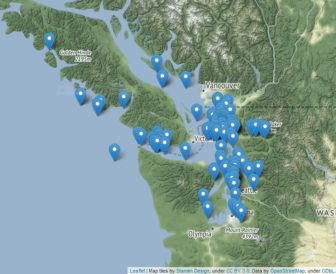
After hundreds of thousands of Atlantic salmon escaped from Cooke Aquaculture’s net pens in Cypress Island in the San Juan Islands, 1,964 were reported caught in these areas
Say goodbye to Atlantic salmon fish farms. Motivated by the summertime escape of more than 243,000 farmed Atlantic salmon from Cooke Aquaculture’s collapsed net pen in the San Juan Islands, the Legislature voted to kick the industry out of the state. Specifically, lawmakers in HB 2957 banned new leases for Atlantic salmon net-pen farming and forbade renewal of existing leases. Not giving up, Canada-based Cooke and the Washington Fish Growers Association called on Gov. Jay Inslee to veto the bill sponsored by retiring Rep. Kristine Lytton, a Democrat from Anacortes. The company is exploring “all our available options,” Joel Richardson, vice president of public relations, said in a prepared statement. Before the vote, he threatened mandatory arbitration under the North American Free Trade Agreement “to recover our confiscated investment, plus costs and lost profits” if the Legislature approved the ban. “We are deeply disappointed,” he said after the vote, adding that 600-plus rural Washington employees and their families depend on the firm for their livelihoods.
Will Washington tax greenhouse-gas pollution? Legislators opted to leave it to voters to decide this fall whether Washington will combat global warming by imposing a “pollution fee” on greenhouse gas emissions. Gov. Jay Inslee sought to make Washington the first state in the nation to pass a carbon tax, marking his sixth attempt to forge an economic policy to reduce greenhouse gas emissions. He got closer this time: A bill filed by Sen. Reuven Carlyle (SB 6203), which would’ve added about a dime to the cost of a gallon of gasoline and boosted other energy costs, passed several Senate committees. That alone is historic, said to be the first time that a carbon fee was approved by any panel of state politicians. But the bill died in the Senate. That’s not the end of the discussion, though. A citizens’ initiative is likely to appear on the November ballot seeking a “pollution fee” on large emitters of greenhouse gasses. Proponents have until July 6 to turn in signatures from at least 259,622 registered voters.
Will Washington commit to stronger climate-protection targets? Not this year. A bill sponsored by Rep. Joe Fitzgibbon, a Democrat from Burien, aimed to tighten the state’s climate-pollution reduction targets to be consistent with the most recent assessment of climate change science. Examples: By 2035, the goal would be to reduce overall emissions in Washington State to 40 percent below 1990 levels, compared to a current goal of 25 percent. By 2050, there’d be an 80 percent reduction below 1990 levels versus a current goal of 50 percent. Those are similar to the national goals set under the Obama administration.
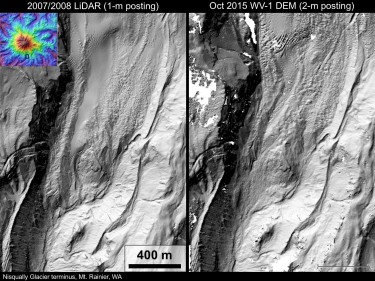
Mount Rainier’s shrinking Nisqually Glacier has retreated 1,000 feet in just a few years — from 2007 (image at left) to 2015 (right).
Proponents saw a need to set strong long-term goals to be consistent with current science and to align with efforts of other industrialized nations. Arguing that the goals are symbolic and create litigation exposure for the state, Mary Catherine McAleer of Association of Washington Business testified against the bill at a Senate committee hearing, adding there are no tools necessary to meet the goals. Upshot? The House passed the bill (HB 1144) along party lines and it made it to the Senate floor calendar, but time ran out. “I’m told that it had the votes to pass,” Fitzgibbon said via email, “so I was very disappointed that the Senate did not get to it in time to pass it.”
“All in all, it was not a good session for climate legislation. I am hopeful that future Legislatures with bigger Democratic majorities will be able to pass more meaningful climate policy than this year’s did,” said Fitzgibbon.
Appliance efficiency. Who doesn’t love more efficient appliances? Actually, industry. Industry representatives laid out a list of reasons why they didn’t like a bill (HB 2327) filed by Rep. Jeff Morris, a Democrat from Mount Vernon, which aimed to establish minimum energy and water standards for faucets, showerheads, urinals and a wide range of other products that aren’t already covered by federal efficiency standards. Industry representatives testified at a committee hearing that they had issues with including air purifiers, consumer technology products and ventilation hoods all in the same bill — consumer tech products are very different from appliances. Besides, mandatory efficiency rules would stifle innovation and drive up appliance prices, hurting low-income consumers and small businesses. The bill died in the Senate.
What happened? Rep. Joe Fitzgibbon, a Democrat from Burien and a co-sponsor, noted that this bill and others like it by Rep. Morris “have passed the House many times in the past and I expected it to pass easily in the Senate this year.” But business lobbyists lobbied hard once it reached the Senate, “and caused several Democratic senators to get cold feet about the bill,” Fitzgibbon said.
Save the whales? Not this year, as far as the Legislature is concerned, although Gov. Jay Inslee quickly issued an executive order. Here’s the story: Legislation by Democratic Sen. Kevin Ranker of Orcas Island sought to create the Orca Protection Act. It would have beefed up enforcement against harassment of killer whales, making it illegal to fly aircraft or a drone within 200 yards of orcas, for example. It called for looking into what to do about the impacts from noise from boat motors, which confuses orcas’ crucial echolocation skills, among other effects. The bill (SB 5886) died — but within days, Gov. Inslee on March 14 issued Executive Order 18-02 to create an orca recovery task force and called for immediate action by various state agencies by concrete deadlines.
Examples: By April 30, state recreational and commercial fishing regulations must be reviewed and changed, as needed, to prioritize protecting key areas and fish runs for southern resident orcas, the ones that frequent Puget Sound but are starving due to lack of the sole food they eat — Chinook salmon. April 30 also is the deadline to come up with a proposal to alter fish food in fish hatcheries to limit the amount of dangerous chemicals called polychlorinated biphenyls, or PCBs, found in orcas’ prey; the toxic chemicals contribute to the orcas’ decline.
The governor also called for a plan to enforce Chinook fisheries regulations in areas frequented by orcas, as well as a plan to enforce vessel regulations, both due April 30. By May 31, the transportation department must come up with strategies for quieting state ferries in areas most important to resident killer whales.
“This is a critical challenge of our time and we have some tough choices ahead on our watch,” said Chris Wilke, executive director of the Puget Soundkeeper Alliance, who applauded Inslee’s move, though recognized that it’s largely another study with some funding thrown in to better track orcas. “We clearly have some big things that we have been trying to tackle in the Legislature and we still have some unfinished work to be done there,” Wilke said.
What is especially needed, Wilke believes, is more money to clean up stormwater pollution and keeping river waters cool enough for salmon since “that’s what’s ultimately going to save the orca whales.”
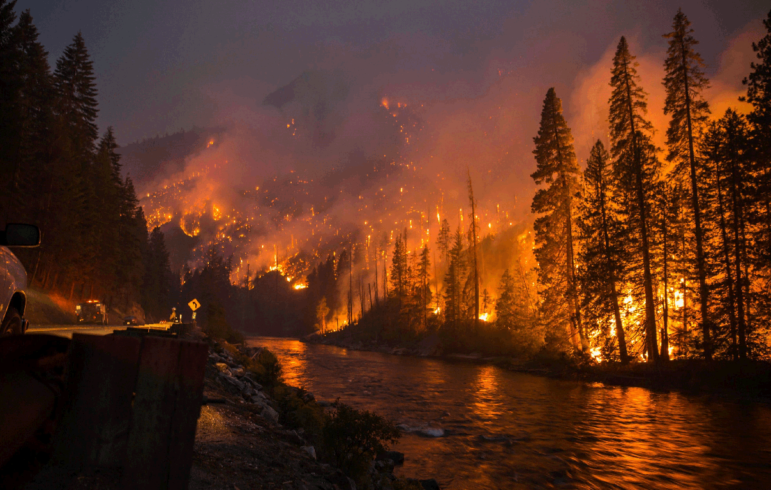
A lightning-sparked wildfire blazes through 22 square miles near Leavenworth in the July 2014 Chiwaukum Complex fire.
Natural resources – good news and bad news. First, the bad news: Washington State expects to bring in an extra $1.3 billion in revenue through 2021 in existing taxes, so guess how much of that windfall is pegged for natural resource agencies? Answer: $25 million, says Tom Bugert, state legislative director for The Nature Conservancy in Washington, who calls it a “disappointment.” Forests need help. Case in point: The state Department of Natural Resources’ Forest Health Program — which aims to thin forests that have grown overcrowded as people over the last century fought fires that would have produced a more natural pattern — sought legislative help. They asked for $1.9 million from legislators with a goal of treating 1.25 million acres over the next 20 years. Experts say about twice as much forest needs to be thinned over the same period to reduce the risk of catastrophic wildfires. Legislators okayed about $500,000.
“It’s not nothing,” Bugert notes, but it portends an inadequately staffed-up project for this era of megafires.
Now, the good news: Overall this legislative session, “we saw a real focus on a lot of natural resource priorities,” Bugert says. Key example: The capital budget unleashed $766 million for natural resource priorities that included reducing flood risks and helping ensure reliable water supplies. “It was a huge conservation success story. I think that’s something we can’t celebrate enough,” Bugert said.
Air pollution at ports. Air pollution kills about 1,000 Washington residents every year, according to the Puget Sound Clean Air Agency. A bill by Democratic Rep. Jake Fey of Tacoma (HB 2601) would have mandated that major ports in Seattle and Tacoma stop allowing the most-polluting delivery trucks to operate there by Jan. 1. Only about half of the short-haul trucks meet 2007 federal emissions standards, putting at risk the health of workers and neighbors. While the Legislature was considering the bill, the ports agreed on their own that trucks that don’t meet 2007 federal emissions standards cannot operate there after Jan. 1.
Development versus salmon. Bipartisan agreement early in the session was widely hailed for resolving a dispute over water availability that had prevented thousands of rural landowners from building on their property. However, environmentalists and Indian tribes condemned the legislation (SB 6091) as a sellout to development interests. A Washington Supreme Court ruling in a case known as the Hirst decision held that county governments were responsible for ensuring that water withdrawn to support new development does not imperil salmon and other fish and aquatic creatures by making streams run low, which can kill fish.
The Building Industry Association of Washington lauded the legislation, saying it “will ensure home builders can get back to building in rural areas that rely on household wells, and will help the people of Washington in keeping housing affordable.”
But the Northwest Indian Fisheries Commission said, “the State Legislature and Gov. Jay Inslee are writing a bad check on our limited water supply at the cost of salmon, future generations and holders of senior water rights.” Tribes hold the senior water rights. The Center for Environmental Law and Policy, the leading environmental watchdog on Washington water law, said on the day of the law’s passage: “Special interests including the building industry and real estate agents pressured the Legislature to ignore the science and ‘fix’ the decision so that rural sprawl could continue unimpeded. Today, Legislative Democrats gave in to that pressure.”
Old development rights. Rep. Roger Goodman, a Seattle Democrat, tried but again failed this year to rein in an unusual provision in Washington law that has repeatedly authorized major real estate developments to go forward even after it’s been determined that they violate the Growth Management Act, which seeks to constrain urban sprawl. The provision, known as “vesting,” has allowed thousands of homes to be built based on land use rules in effect when the development was first proposed instead of current rules and laws including the Growth Management Act. The legislation (HB 2100), did not even get a committee hearing.
Protecting fish and shorelines. Environmentalists, tribes and the Washington Department of Fish and Wildlife have long called for the agency to be able to issue fines for unpermitted construction in state waters, which can harm fish and other aquatic creatures. Under the state’s Hydraulic Permit Approval program, which was adopted in 1943, the agency can fine builders up to $100 a day, which critics — including the department — say builders view as merely the cost of doing business. The agency can take violators to court, but that means convincing local prosecutors to file charges — usually a difficult sell. Rep. Joe Fitzgibbon, a Burien Democrat, sought to give the department the authority to issue stop-work order and fines of up to $10,000. But the measure was opposed by builders and other business interests. The bill (HB 2337) got a hearing in the House Agriculture & Natural Resources Committee but after that went nowhere.
Robert McClure contributed to this report.
This story is part of InvestigateWest’s Statehouse News Project, a crowdfunded effort to provide independent reporting on environmental issues considered by the 2018 Washington Legislature. Please support the project with a tax-deductible donation at www.invw.org/donate.

